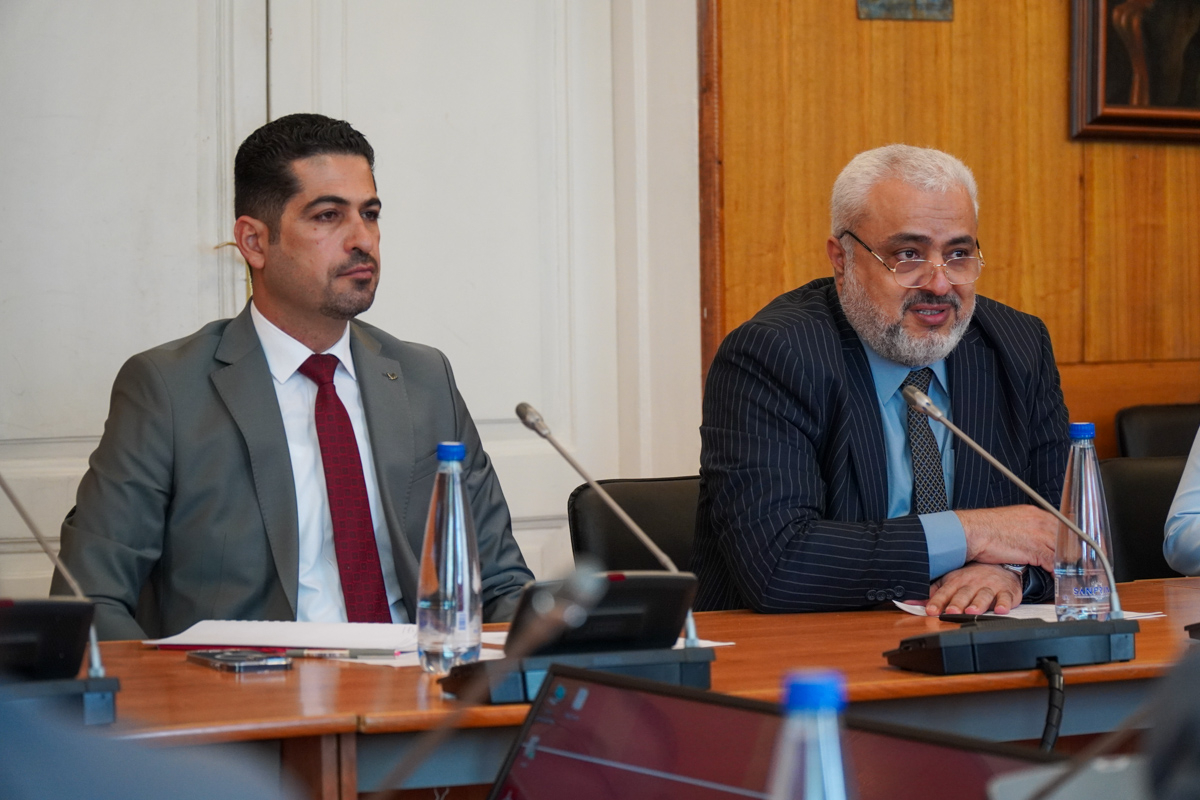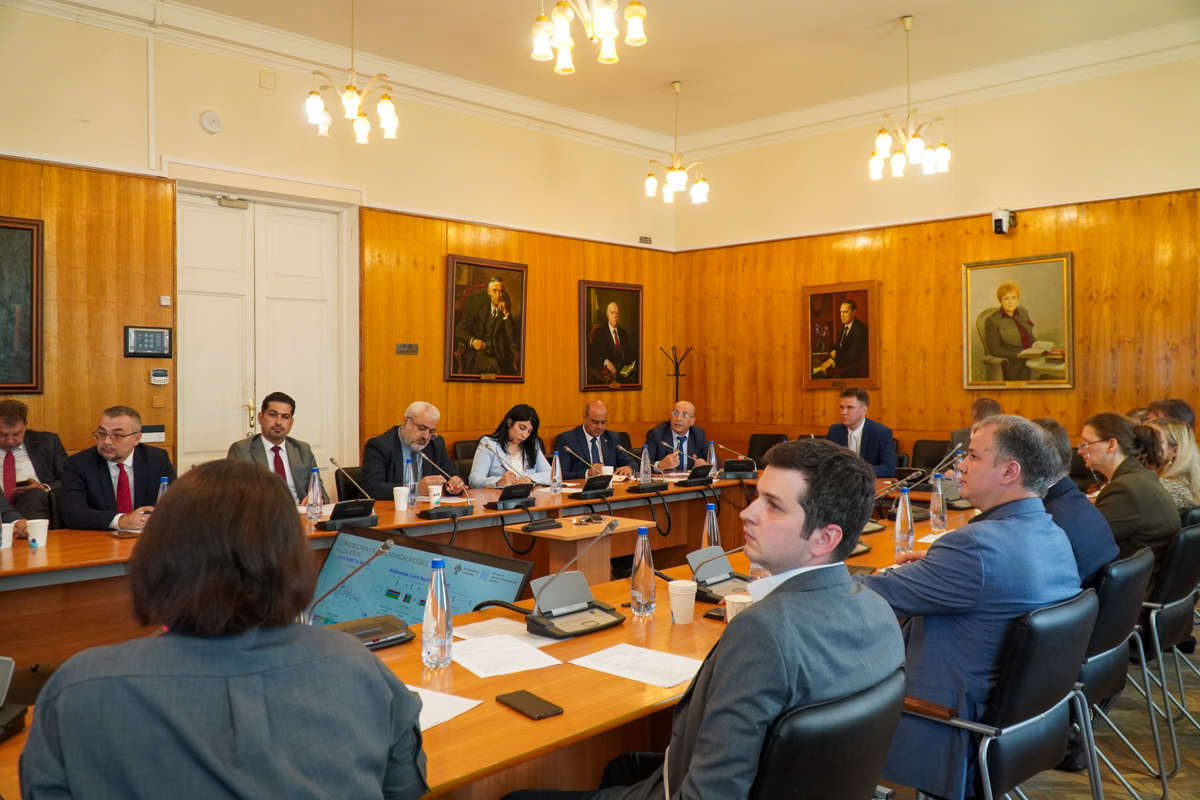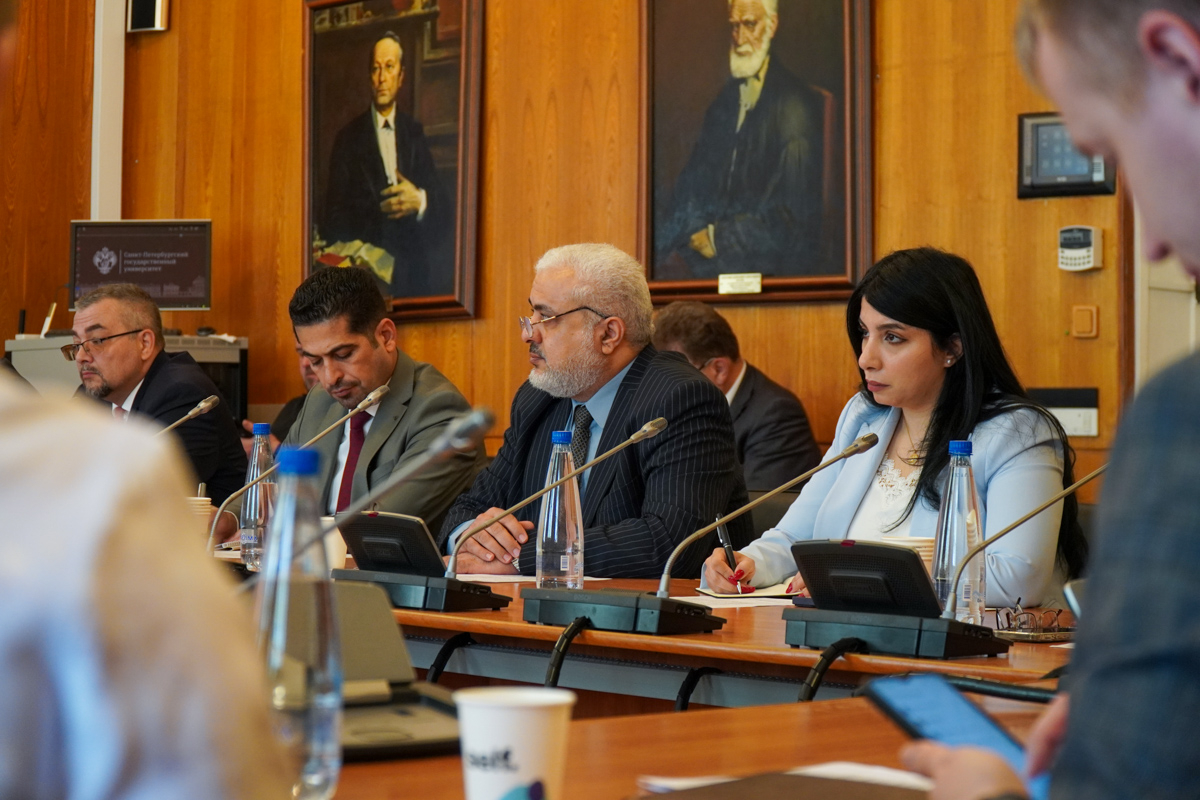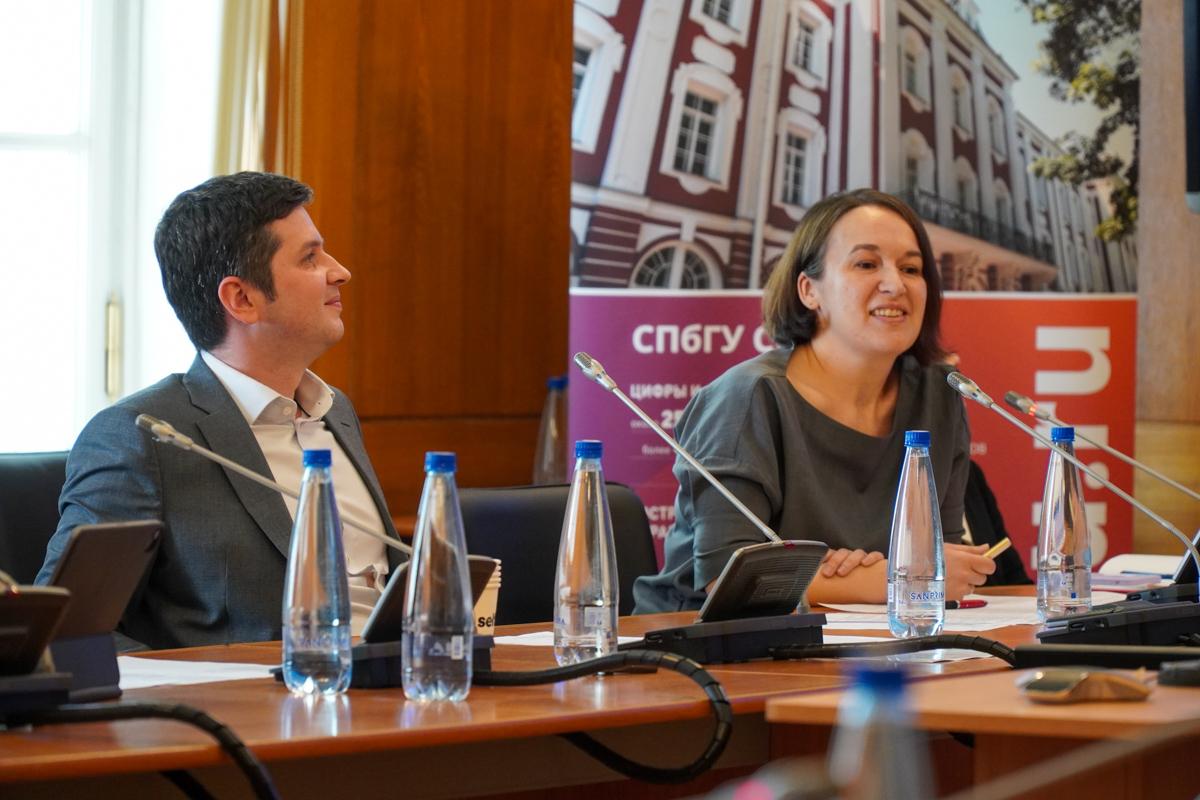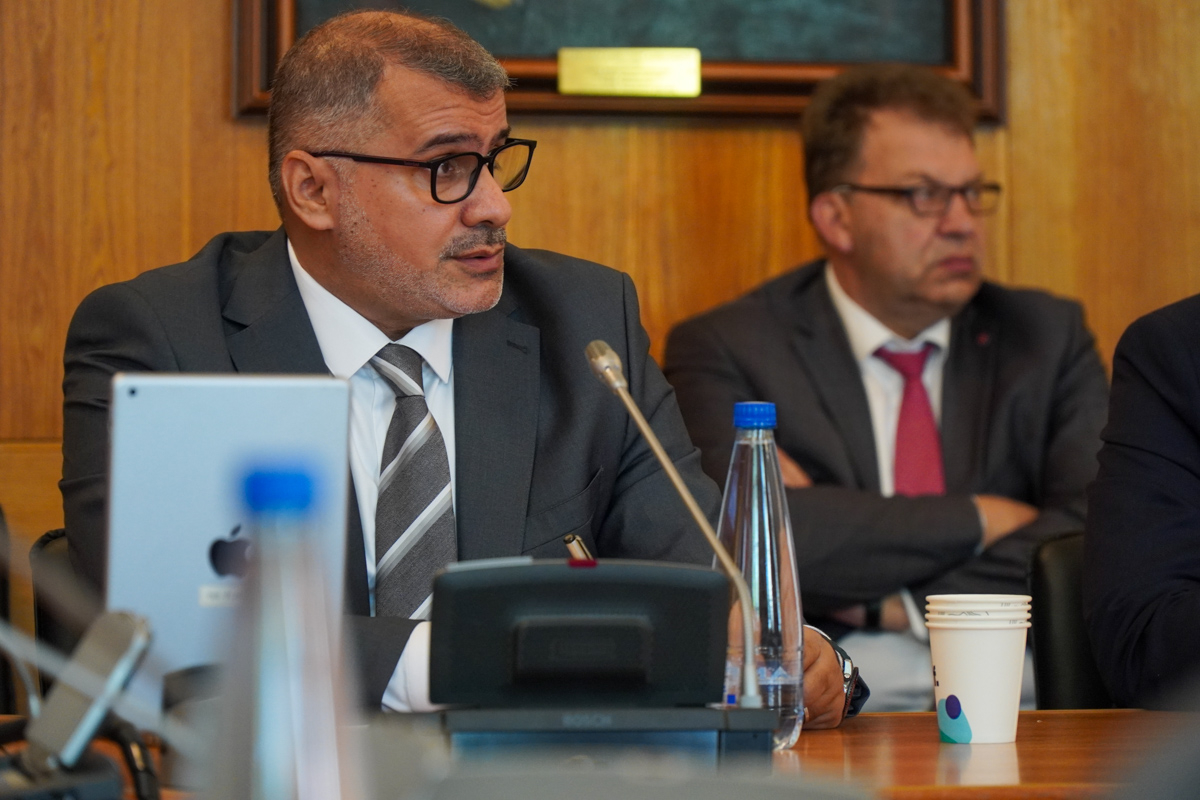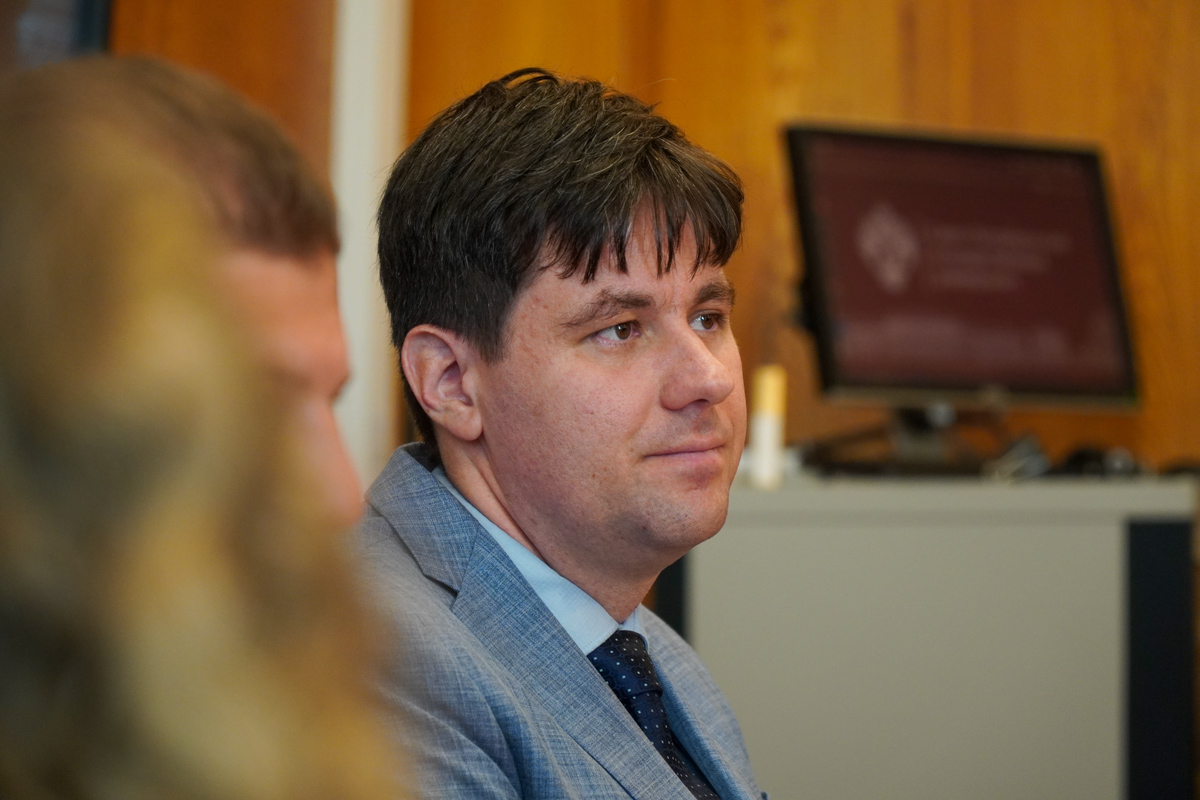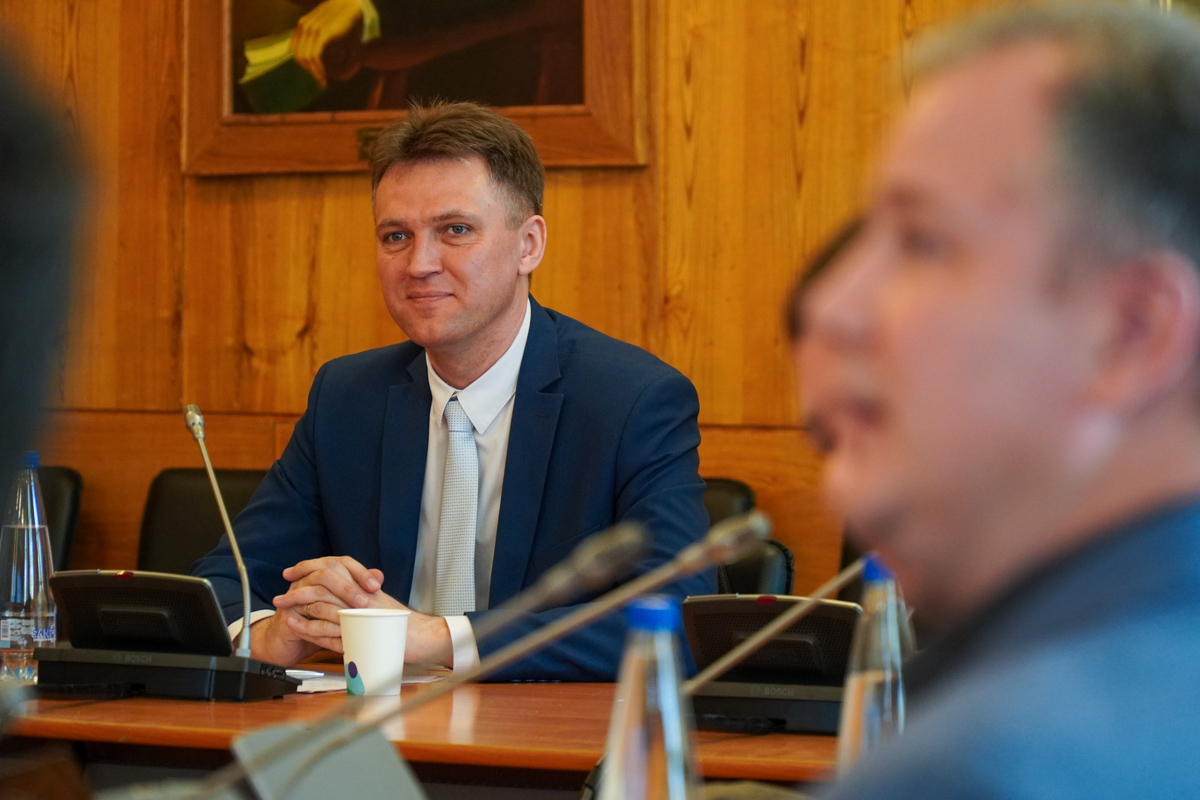Delegation from the Iraqi Ministry of Oil apprised of the research developments of St Petersburg University scholars
Representatives of the Republic of Iraq Ministry of Oil and the Basra Oil Company have visited St Petersburg University. The purpose of the visit was to be apprised of the latest research in the fields related to the oil and gas industry — materials science; chemistry; physics; and ecology; and of the educational and logistical capabilities of St Petersburg University.
The guests were welcomed by Sergey Andryushin, Vice-Rector for International Affairs at St Petersburg University. "The University has had a long history of cooperation with leading Russian oil and gas companies. We do research for them and help them improve business efficiency," said Sergey Andryushin. "Your visit will help us to find overlapping interests and identify projects that we could implement together in future. We will be happy to establish cooperation with the Ministry of Oil and oil production companies of the Republic of Iraq."
Abdul Baqi Khalaf, Advisor to Iraq’s Minister of Oil for Energy Affairs, said that today, when climate change has become a major global issue, the need for a new energy transition has become evident. Iraqi Oil Ministry representatives have travelled to St Petersburg University to learn about the best practices and achievements of Russian researchers in addressing these issues. "We are happy to be here, in this stronghold of Russian science and education that has had a long history of knowledge development," Abdul Baqi Khalaf said.
The meeting was also attended by Sergey Mikushev, Vice-Rector for Research at St Petersburg University; Hikmat Nazem Younis, Head of Training Directorate of the Training and Development Department; Hiraa Rasul Abdelali, Head of the Department of Academic Education of the Training and Development Department; Bassem Mohammed Jalil, Deputy Director General for Production and Chairman of the West Qurna-2 Joint Management Committee; and representatives of PJSC Company Lukoil.
Currently, over 900 ongoing research projects are being implemented at St Petersburg University. Experts of interdisciplinary cross-sector research projects told the guests about their work. Evgenii Shevchenko, Acting Director of the Centre for Diagnostics of Functional Materials for Medicine, Pharmacology and Nanoelectronics at St Petersburg University, presented the Ladoga carbon polygon project designed to unite the efforts of experts from different fields of knowledge within the framework of measures to achieve carbon neutrality in the region. The project participants are scholars — economists; lawyers; biologists; physicists; climatologists; oceanologists; and other specialists engaged in organising and conducting integrated research on: aerosol sources; atmospheric composition; biomass estimation and carbon stocks in ecosystems; and environmental monitoring.
The implementation of the project involves organising long-term monitoring in a representative area of our region. The project’s practical implications include the development of technological solutions and training programmes for the realisation of so-called carbon farms. They can be organised, for example, on post-mining land or unused agricultural areas to provide additional carbon sequestration.
Evgenii Shevchenko, Acting Director of the Centre for Diagnostics of Functional Materials for Medicine, Pharmacology and Nanoelectronics at St Petersburg University
Another objective of the project is to train personnel in the field of carbon balance control technologies. The training curriculum for students of the relevant academic programmes includes thematic courses related to: climate change; sustainable business management; ecosystem management; carbon cycle; and geoinformation systems.
St Petersburg University heads the list of research organisations in Russia in the number of publications on subjects related to the green transition. Since 2016, the University researchers have implemented research projects in the field of ecology and climate change worth over 300 million roubles.
In 2024, the Advanced Engineering School "Interdisciplinary Research, Technologies and Business Processes for the Mineral Resources and Raw Materials Sector of Russia" was established at St Petersburg University.
Its main goal is to produce well-educated and highly-skilled engineers who have received fundamental education and have obtained interdisciplinary knowledge, including economic and digital competences. At present, St Petersburg University offers bachelor’s and master’s programmes in Petroleum Engineering and master’s programmes: "Geological Support for Hydrocarbon Reservoirs Development" and "Geophysics and Computer Technologies for Data Analysis". Additionally, in 2025, three new academic programmes are to be launched: "Petroleum Geology"; "Geology and Geochemistry of Oil and Gas"; and "Economics of Mineral Resources Engineering".
"The Advanced Engineering School differs from classical educational structures. Our curriculum was designed in close cooperation with high-tech companies. They open specialised laboratories at the University to accomplish research objectives and address production issues, while the students participate in the laboratories’ work during their studies. Hence, a graduate can be easily integrated into the production process," explained Vyacheslav Polovkov, Director of the Advanced Engineering School at St Petersburg University.
Senior Research Associate Aida Rudakova made a presentation on the projects carried out by the Carbon Neutrality Centre at St Petersburg University. The Centre was opened in 2024 to develop technological solutions in the area of alternative energy development and decarbonisation in collaboration with Guǎngxī University (China). The Centre is led by Professor Detlef W Bahnemann, a world-renowned researcher, who also heads the Laboratory of Photoactive Nanocomposite Materials at St Petersburg University.
The first research project aims to optimise carbon dioxide (CO2) capture by chemical absorption. The project’s specific feature is the utilisation of ash, a waste product of combined heat and power plants (CHPs), with the collected CO2 being further processed. Researchers from North China Electric Power University are involved in this research project. The second research project is implemented in cooperation with partner universities from Brazil and China. The project goals are twofold: to search for a new generation of photoactive materials in order to create a wastewater treatment system; and to develop a technology for converting solar energy into chemical fuels. The international team of researchers won a grant from the Ministry of Science and Higher Education of the Russian Federation within the framework of the cooperation agreements with BRICS countries. According to Aida Rudakova, in future, these two projects could be combined, as they easily fit into one technological chain.
Marina Shelyapina, Professor in the Department of Nuclear Physics Research Methods at St Petersburg University, made a presentation about the international project launched in 2023 in conjunction with RUDN University and the National Autonomous University of Mexico, with the support of the Ministry of Science and Higher Education of the Russian Federation. Her research team is working on the conversion of crude glycerol, a by-product of biodiesel production, into value-added products. The main objective is to find an efficient catalyst for such reactions. In her presentation, Professor Shelyapina spoke about the development of new materials with enhanced properties.
Aleksei Povolotskii, Professor in the Department of Laser Chemistry and Laser Materials Science at St Petersburg University spoke about the technology developed by the chemists of the Advanced Engineering School at St Petersburg University, which enables environmentally safe production of hydrogen fuel, leaving no carbon footprint.
The scientific idea is to create a portable device for pyrolysis of hydrocarbons in laser plasma. The process generates hydrogen gas and a solid carbon product that contains: graphene, single-walled nanotubes and diamond-like nanoparticles. Thus, even the hydrogen production waste will have high added value.
Aleksei Povolotskii, Professor in the Department of Laser Chemistry and Laser Materials Science at St Petersburg University
The device operation will not require any special safety precautions, because hydrogen fuel will be produced in the amounts needed for immediate use; thus, solving the fuel transportation issues. Professor Povolotskii added that St Petersburg University students are involved in conducting high-tech research, acquiring the necessary skills to operate the equipment.
Marina Besedina talked about the technology of geochemical identification of the share of hydrocarbon fluid from one deposit in the mixture of hydrocarbon fluids from several deposits in joint exploitation. The technology is being developed by chemists from two laboratories of the Advanced Engineering School at St Petersburg University — the Laboratory of Geochemical Analysis of Petroleum and the Laboratory of Digital Analysis of Chemical Data.
Mariia Vetrova, Deputy Director of the Advanced Engineering School and Assistant Professor in the Department of Economics of Enterprise, Entrepreneurship and Innovation at St Petersburg University, told the guests about the non-degree programmes implemented by the Advanced Engineering School, which meet the current trends in ESG transformation in business and environmental management. For example, the programme "Climate Engineering in Nature-Based and Technology-Based Projects Aimed at Decarbonisation of Carbon-Intensive Sectors of the Economy" is in high demand today.
Innokentii Karandashov, Associate Professor and Acting Head of the Department of International Law at St Petersburg University, spoke about the master’s programme "International Private Law".
The meeting also discussed the possibility of academia-industry collaboration aimed at creating and updating current academic programmes, and developing professional development and re-training programmes with English as the language of instruction.


